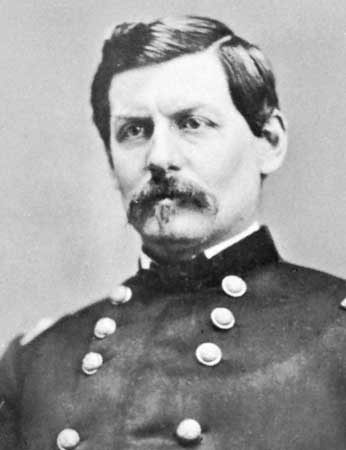Victimized by Certainty: A case study in leadership and impossible odds
 |
|
General George McClellan
|
I've always enjoyed studying history, and I'm a firm believer that in order to better understand the future we have to first understand how to make sense of the past.
Over the past two weeks I began watching Ken Burns' The Civil War again. In watching this series, I found relevance to problems many of us face today, particularly in the tale of two generals on opposing sides of the war. If I ask you right now to name a famous Civil War general chances are you'll first think of Robert E. Lee or Ulysses S. Grant. What many do not realize is that Gen. Grant did not take command of the Union Army until the last half of the war effort. Until that point there had been a succession of different commanding officers that followed Gen. George McClellan, who, at least according to history, was a colossal failure as a commanding officer.
During the Civil War It was said that George McClellan commanded the greatest military force up to that point in US history. However, despite what McClellan had in military might, he lacked the courage to act unless victory was guaranteed. You could say that George McClellan was a victim of certainty.
Robert E. Lee on the other hand was the exact opposite. Hailed
 |
|
General Robert E. Lee
|
as one of the greatest military generals in history, Lee repeatedly took risks in the face of impossible odds and regularly came out victorious on the other end. His strength was found in his uncanny ability to anticipate the enemy's next move and act accordingly. Regularly out-manned and out-gunned, Lee had the audacity and confidence to act in the face of impossible odds and uncertainty.
Like McClellan, so many leaders in organizations and institutions want absolute certainty before taking action. This is symptomatic of fear about the future that leads to unrealistic expectations of success. What makes these expectation so difficult to manage is that we often do not realize that the expectations are even there. For example, I have never heard anyone readily admit to needing absolute certainty before taking action. Most would agree that is an impossible expectation, yet as the old saying goes, "Actions speak louder than words." To that, I would like to add that inaction speaks loudest of all.
In order to take any real action towards long-term progress in the future we must take an inventory of our belief system, our mindset, and our worldview. McClellan continuously refused to believe the information that was being relayed back to him by his commanding officers. As a result he repeatedly made requests of President Lincoln for more troops and more supplies because he believed that he was outnumbered and outgunned despite evidence to the contrary.
Despite what we may say we believe about the environment we
are operating in, our behavior is the ultimate litmus test. McClellan's behavior clearly shows that he associated taking risks with "carelessness." In some cases this assessment is absolutely legitimate. Taking action without assessing the environment, analyzing available data, and considering multiple options and outcomes will certainly equate to "carelessness." But many today fail to act despite an excess of information about the business environment and relative data allowing for multiple options and outcomes. If you think my assessment of McClellan is too harsh then consider this: McClellan was once given the opportunity of a lifetime to destroy the army of General Lee once and for all and effectively end the war after several bloody years. A copy of Lee's battle plans had accidently been left behind in a cigar holder. McClellan had in his hands the greatest weapon of all, absolute certainty, yet he again refused to act. A full 18 hours passed before he did anything at all.
As we face great uncertainty in the 21st-century, many well-suited and well-equipped institutions, organizations, and communities are failing to take action because success is not guaranteed and the perceived risk is too great. Leadership in the 21st century environment falls into two categories: Lee and McClellan. Lee's leadership style was adaptive, resilient, and anticipatory. McClellan's leadership was passive, hesitant, and defensive.
Where do you fall on this scale? Are you hunkered down, defensive, and waiting for the "perfect" conditions to take action, or are you using your resources, knowledge, and all available information to anticipate and adapt to sudden change and unexpected events?
One of Lee's aids once told Lee that McClellan has brought the most magnificent army to meet them in battle. Despite seemingly impossible odds, he also said that Lee and his army had one key advantage: McClellan brought himself along with it. Had McClellan been left in charge the outcome of the war may have been very different.
As you consider the legacy you're leaving as a leader, ask yourself how your action or inaction will be remembered. Are you willing to take action in the face of uncertainty in order to meet your objective? Or, are you holding back in order to preserve what you already have?